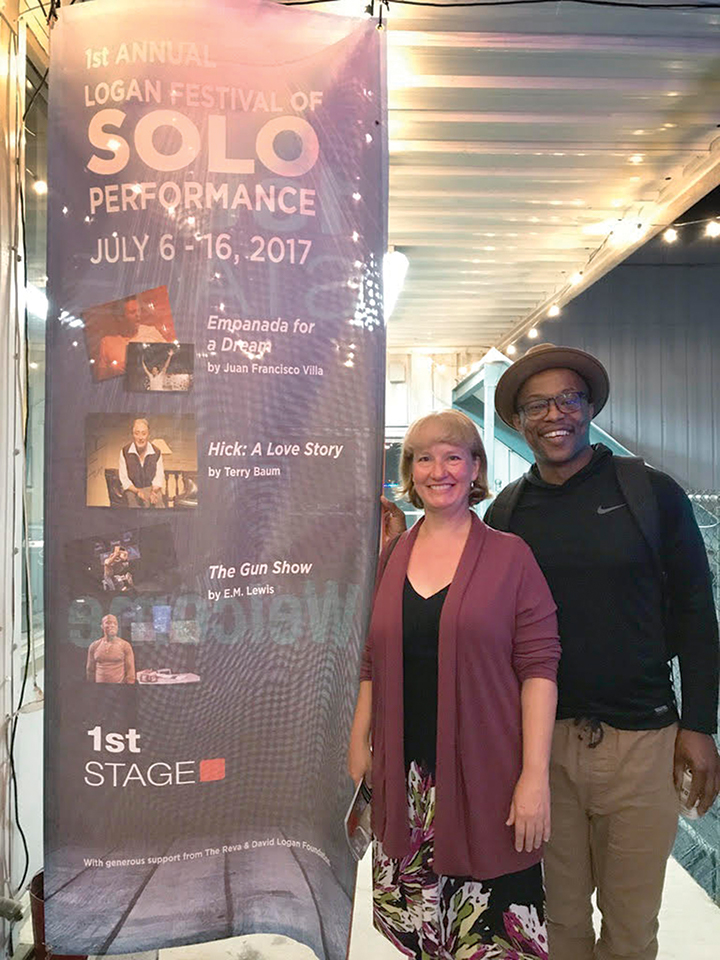At a time when sociopolitical issues like climate change and gun ownership divide Americans, the work of playwright E.M. (Ellen) Lewis ’94 is more relevant than ever.
Lewis is an award-winning playwright, teacher and librettist whose first full-length play, “Song of Extinction,” attracted the national spotlight in 2008. Her other plays, which have appeared in festivals and at theaters worldwide, often contain a common theme — characters devastated by a social or personal challenge must figure out how to move on with determination, community, humor and hope.
In “The Gun Show,” which ran at Willamette in December 2017, a male actor portraying Lewis reenacts real experiences she’s had — a robbery, shooting guns with her boyfriend for fun — that encompass the emotional nuance behind the national debate over firearms. During an opera Lewis recently co-created called “Town Hall,” slated to be performed at Willamette next year, a small-town librarian takes over a public event about healthcare.
Audiences are hooked on her work. Since its 2014 debut, “The Gun Show” has had more than 25 productions, with more to come in Montana, Oklahoma and Pennsylvania. Unfortunately, Lewis says, the subject doesn’t stop being topical.
“I think the anger is only increasing,” she says. “We need to do something, but what?”
Set in 1986, Lewis’s play “Magellanica” is an ambitious, five-and-a-half-hour performance about the discovery of a hole in the ozone layer over Antarctica. After it premiered in January 2018 at the Artists Repertory Theatre in Portland, with costumes designed by Willamette theatre professor Bobby Brewer-Wallin, the play drew widespread praise. Media outlets including The New Yorker lauded Lewis for using the zeitgeist of the period to echo today’s concerns about climate change.
Lewis spent eight years creating “Magellanica,” amassing three shelves’ worth of books about climate change, the Cold War and Antarctica. Writing took its toll — at one point, she was frustrated because the characters were too complex (“Never write people who are smarter than you into your play,” she jokes).
Yet even during the most challenging creative struggles, she found joy.
“Writers have deep emotional and internal reasons why we need to tell stories,” she says. “Stories erupt out of me — I’m always thinking in terms of dialogue and character.”
Lewis hasn’t always been this way. After high school, the Oregon native considered a career as a nurse or teacher, then attended a few other colleges before arriving at Willamette. She’d enjoyed creative writing, but didn’t understand that a person could make a career out of it.
College — and particularly her time at Willamette — proved to be a revelation.
She says, “The writing and critical thinking we did at Willamette was absolutely fundamental to me as a playwright.”
Lewis was also stirred by Willamette’s motto, “Not unto ourselves alone are we born.” Social responsibility is important to her as an artist and human being, and it’s a theme found in her newest play, “The Great Divide,” which was inspired by the 2016 occupation of the Malheur National Wildlife Refuge in eastern Oregon. Like “The Gun Show,” the play encourages people to start conversations with others, Lewis says — nobody’s talking right now, and that’s not working.
“We’re all in this together,” she says, “and we have more in common than what separates us.”
This article was originally published in the fall 2018 issue of Willamette magazine.

